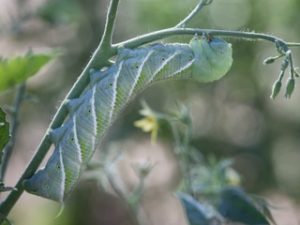By Helen Willoughby-Peck (UC Master Gardener, Mariposa)
It is a good idea to take a walk in your garden every day. It is good for you, but more importantly, it is good for your plants. Observing your plants on a regular basis can help control pests beginning to enjoy your tomatoes before you can. When caught early, pests are usually easy to control without insecticides or any other drastic actions.
You can get any number of pests in your garden, on your tomato plants, as well as other veggies. Mites, beetles, thrips, whiteflies, worms, stinkbugs, aphids, leaf miners, and the list goes on. But, don’t be discouraged. Tomato plants are hardy and pests usually can be managed without insecticides. Diligent observation, knowing the difference between pest insects and beneficial insects, and dealing with pest problems as soon as they appear go a long way in pest management.
One common and easily controlled pest is the tomato hornworm. As shown in the picture, the hornworm can camouflage itself so well that it looks like a tomato leaf. If you notice defoliation of your tomato plant leaves, it’s likely tomato hornworms. They are tricky to find since they blend in so well with the tomato plant leaves. Check the leaves and ground below the plant for 1/16th inch black pellets of excrement. . . a tell-tale sign. Look straight up from there and you will find a hornworm, usually about the size of a finger. Hand pick them off the plant and drop them in a pail of water.
Aphids can sometimes be a problem, especially in years with a cooler spring. Look under your leaves, or on tender new growth for tiny, oval, green, yellowish or black insects and use a sharp spray from a hose to remove them. They are probably not going to take the trek back up the plant to re-infest your plant.
It is best to accurately identify any pests that you are concerned with. Many pests need no control unless infestations are very severe and many are kept under good control by natural predators or parasites — other insects that eat pests or lay eggs in them.
If insecticidal control is needed use a product that is specific to your pest. Broad-spectrum insecticides can cause more harm than good by destroying good insects that prey on your pests and consequently upset nature’s balance. By destroying beneficial insects, there is an increased possibility of a surge in the populations of pests because their natural insect enemies have been destroyed.
For assistance in identifying insects and advice on how to best treat specific pests, stop by the UC Master Gardener help desk with a sample, or email a photo with an explanation.
Listen to local interviews on KRYZ, 98.5 FM
The UC Master Gardener Helpline and Helpdesk are staffed Tuesdays from 9 a.m. to noon, and Thursdays from 2 – 5 p.m. Please contact the helpline by phone at: (209) 966-7078. By email (send photos and questions for researched answers) to: mgmariposa@ucdavis.edu
Master Gardener Office Location:
UC Cooperative Extension Office,
5009 Fairgrounds Road
Mariposa, CA 95338
Phone: (209) 966-2417
Email: mgmariposa@ucdavis.edu




